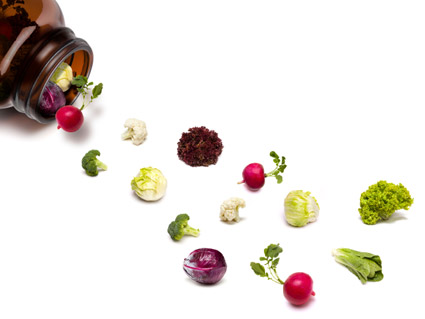Yeah, yeah, multivitamins are good for me, but why? As you may know already, March is National Nutrition Month! Even with all of the pro-health buzz, is it really worth it to take a daily multivitamin even when I eat a good amount of fruits and veggies? Yes, friends, it is important! I recently discovered just how essential multivitamins can be and what I learned changed my opinion.
Why do I need a multivitamin?
As you are strolling the aisles at the grocery store, you look to the labels on which brand of a certain food is most nutritious, correct? You opt for a package that claims to contain “whole grains”, “omega 3’s” or a product that “contains real fruit.” While this may be true, be sure to check the ingredients list on the back—if whole grains are number one or two on the list, this probably isn’t a significant source of this nutrient. Same goes for any other label claim and serving sizes as well—don’t simply look at the number of calories you see right away, look at the serving size and multiply that calorie number by how many servings you consume.
Another thing you may not realize is that even though you may be eating the recommended amounts of essential nutrients, the soil which fruits and veggies are grown in has been depleted of nutrients—meaning that you may not be getting all the nutrients you believe you are. On top of that, the environment we live in has plenty of pollution in it, which makes the need greater to obtain nutrients. Not to mention, only 9% of people get the recommend daily value of fruits and vegetables, according to a study conducted by the University of California. A multivitamin can help fill the gap caused by these things—it won’t completely make up for every nutrient your body lacks, but it will definitely help!
How to choose a multivitamin
Now that you know why multivitamins can be beneficial to everyone, let’s discuss what to look for when choosing a multivitamin to take. It is best to look for multivitamins with 100% of the suggested Daily Value (DV) in the following nutrients:
– Vitamin B1 (Thiamin)
– Vitamin B2 (Riboflavin)
– Vitamin B3 (Niacin)
– Vitamin B12
– Vitamin C
– Vitamin D
– Folic Acid
– Iron
The nutrients listed above are those that we don’t usually get enough of in our usual diets. Besides those, other things to look for in your multivitamin along with the recommended daily allowance (RDA) are:
– Vitamin A—RDA: no more than 2,500 International Units (IU)
– Vitamin E—RDA: 22 IU
– Vitamin K—RDA: 90-120 mcg (most multivitamins don’t contain this much; eat your greens to make up for this!)
– Biotin—RDA: 30 mcg
– Calcium—RDA: 100-1,200 mg (No multivitamin contains this much as the pill would be too large)
– Magnesium—RDA: 310-420 mg (multivitamins don’t generally contain this much since magnesium is abundant in a variety of foods)
– Selenium—RDA: 55 mcg
There were just a few guidelines to stick to as you pick your multivitamin. Keep in mind that just because the brand is generic (cheaper) that doesn’t mean it lacks in quality—just know what to look for! Please do not be fooled into thinking you have to pay a small fortune to take multivitamins daily. Plus, think of how much your health bills will cut down if you’re healthier overall for an extended period! 😉
Have multivitamins improved your life? Which works best for you?





Comments (0)